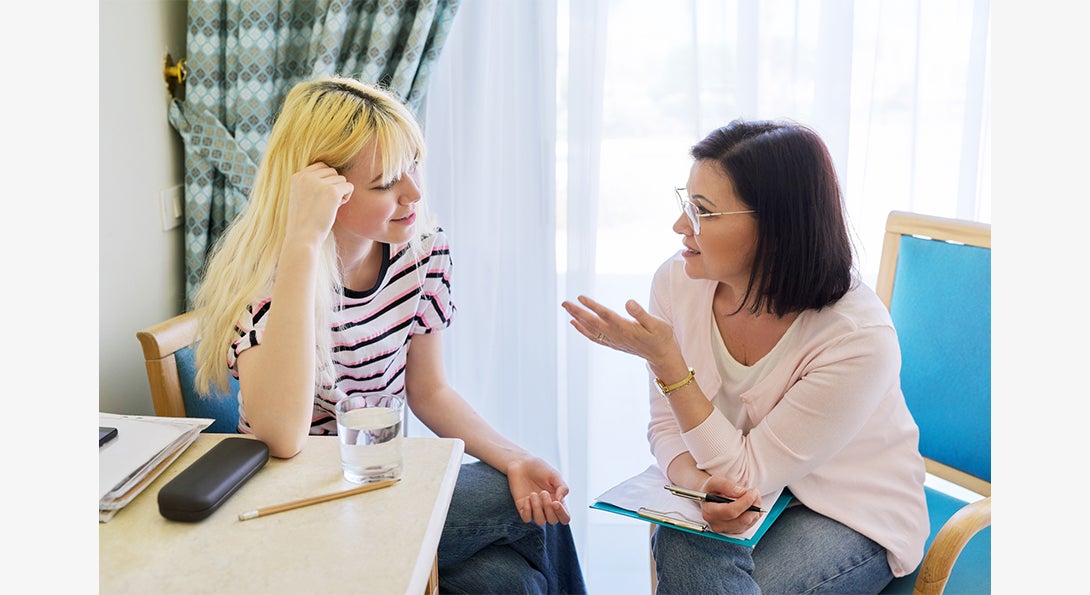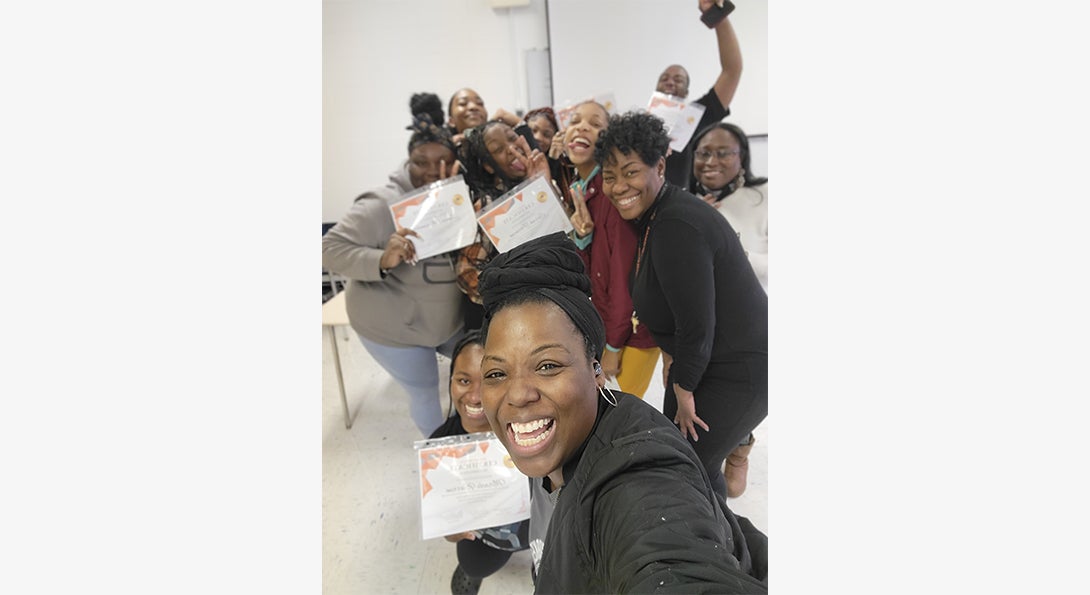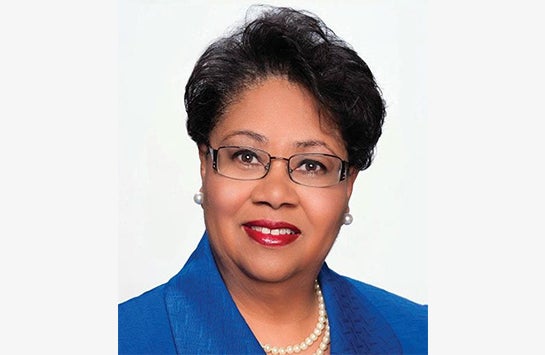School’s in Session

School Social Workers Trained at JACSW Play Integral Role in Students’ Success
Navigating elementary and high school can be daunting for some students. Kids may be faced with mental health or learning issues, poverty, homelessness, hunger, bullying, unstable family environments, or fearing for their life while traveling to and from school through dangerous neighborhoods. Like many teenagers, Jasmine Beamon struggled with juggling various relationships as a student at Chicago’s Whitney M. Young Magnet School, but she knew just where to turn for support: the school’s social worker.
“My encounters with my school’s social worker led me to want to help young people like she helped me,” said Beamon, who received a Master of Social Work degree from the Jane Addams College of Social Work in 2008.
Story continues
For 118 years, when the first “visiting teachers”, as school social workers were then referred, were placed in schools, their role has been to promote student health and well-being, and to help students reach their academic potential. The second most popular of the JACSW’s five fields of study, the school social work specialization, chaired by Annette Johnson, MSW, clinical associate professor, prepares students with competencies for advanced practice in urban public school settings. By using an ecological perspective to develop social work practice, it focuses on the transactions between K-12 students and their environment, with Critical Service Learning (CSL) being a key component of the curriculum that introduces student voice.
A school social worker in the Chicago Public Schools system since earning her master’s degree, Beamon is one of two social workers at Bogan High School on Chicago’s southwest side. She spent her first 11 years in elementary schools before transferring to a high school setting. Five of those years she served as a lead in the school’s social work department.
At Bogan, Beamon assists students in the Individualized Education Program (IEP), helping those with cognitive challenges, emotional disorders or other learning problems. She also participates in weekly grade level and behavioral health team meetings and provides support for all classes in the cluster and transition programs. Additionally, she and her colleague oversee the general education population based upon concerns raised from the yearly social and emotional learning (SEL) needs assessments provided to students in the first five weeks of school.
The elementary school environment was enjoyable to Beamon, but she receives greater satisfaction working with high school students.
“I get more updates on their progress after they have left high school because they return and update me on their lives,” Beamon said. “It is one of my favorite parts of the work.”
Beamon quote
My encounters with my school social worker led me to want to help young people like she helped me.
Story continues

Jasmine Beamon with some of her students
Beamon’s interactions with the students provide her with valuable knowledge to help them inside and outside of school. The information has led to the development of several programs that have benefitted the student body. One, a dating violence program for teens titled “Between Friends,” teaches students how to navigate romantic and platonic relationships, along with gender and sexual identity, and boundaries. The students are predominantly freshmen, and since its initiation Beamon has seen the teens display more empathy and maturity.
In “Grownish,” another program developed by Beamon and her colleague, up to 15 students meet to discuss their fears and concerns about life after high school. The monthly meetings, held during lunch, provide the students with opportunities to share how they are selecting a college or employment, obtaining and maintaining relationships, decision-making, and other consequences that may arise in adulthood.
“The growth we have seen in students over the past two years has been incredible to witness,” Beamon said. “It’s one of the crown jewels in our in-house social work department.”
Prior to entering Western Illinois University, Beamon was contemplating various majors. With her mother earning a master’s degree from the JACSW, she was intimately aware of the social work field. Knowing that her daughter was empathetic to others and excelled in problem solving, she encouraged Beamon to pursue social work.
“I selected the school specialization at Jane Addams because I knew I wanted to work with youth,” Beamon said. “The program taught about community, culture, the law, and substance abuse on micro and macro levels. My special education course was so helpful to me. It opened my eyes to how serious the IEP is as it pertains to the legal responsibility of being a social worker in the school setting.
Instituting new training
Prior to her role as clinical associate professor at the JACSW, Johnson served 18 years as the director of social work for the Chicago Public Schools, providing leadership to more than 400 school social workers and consistently developing new models of practice to address the changing needs of students and faculty.
Recognizing that additional training was needed for practicing school social workers to keep abreast of new innovations, the college instituted the Jane Addams College of Social Work-Training Institute in 2009 to provide practitioners with evidence-informed approaches that can enhance the quality of services they provide in their school-based practice for elementary and high school students. The Institute also provides a forum and collaborative environment for practitioners to share innovative practice models that have been effective in their school setting.
The workshop, held each spring under Johnson’s direction, incorporates hands-on booster sessions to ensure the application of acquired practice and knowledge skills. The Institute is expanding to become a training hub that provides leadership to the state’s school districts.
“Schools are uniquely positioned to identify at-risk behavior among children and youth early and to implement prevention and intervention strategies that can change the trajectory for the youth, the school, and the community,” Johnson said. “Recognizing the need to engage all school-based practitioners, the Institute has broadened its focus beyond school social workers to include other school-linked practitioners, mental health professionals, and community partners.”
More than 3,000 practitioners have advanced their knowledge and skills since the program’s inception, in areas including social and emotional learning, positive youth development, critical service learning, intervention response, and use of technology to enhance clinical practice, data collection, analysis, and program planning. A booster session is held in the fall.
Past presenters have included Kimberly O’Brien, PhD, LICSW, who examined school-based approaches to assessment, prevention, and intervention with suicidal youth in her discussion entitled, “Understanding Youth Suicide and Taking Action,” and Desmond Upton Patton, PhD, MSW, who presented his research on the impact social media has on children, adolescents, and families.
“As we move forward, the Training Institute will continue to uphold the college’s mission of educating its students to the level of professional social workers, advance knowledge in the field, and provide leadership in the development and implementation of policies and services on behalf of the poor, the oppressed, racial and ethnic minorities, and other at-risk urban populations,” Johnson said.
Story continues

Annette Johnson, MSW
Pursuing new avenues
Always searching for new and innovative approaches to assist students, Johnson secured the School-Based Mental Health Grant West U40 two years ago, a five-year $1.5 million project whose primary goal is to increase workforce diversity of school social workers trained to provide mental health services in high-need schools. Qualified students receive two-year tuition waivers and a $10,000 stipend to cover the additional training time in their specialization year. They also receive additional training in evidence-based mental health interventions along with the specialization curriculum.
The JACSW is not limited to training school social workers in the United States. Through a partnership with Osaka Metropolitan (formerly Osaka Prefecture University), the college has hosted Japanese delegations bi-yearly since 2006. Johnson and Cassandra McKay, PhD, associate dean for academic affairs and student services and associate professor, traveled to Osaka in 2013 to conduct lectures and training on integrating Social Emotional Learning and Critical Service Learning into social work education and practice.
“School social work has only been formally recognized in Japan since 2005, whereas it is a 108-year-old profession in Illinois,” Johnson said. “Scholars from OPU want to learn more about the Illinois model, which is considered exemplary in school social work education. In turn, JACSW scholars are interested in supporting the development of social work in Japan and fostering intellectual exchange for social work practice, policy, and research.”
In September 2024, Johnson was instrumental in renewing the Memorandum of Understanding (MOU) between Osaka Metropolitan and the JACSW.
On the right track
Beamon elected to attend graduate school immediately following reception of her undergraduate degree. Many of her fellow students, she discovered, were pursuing social work as a second career. As a younger student with little experience, she felt intimidated by her classmates’ “real world” knowledge. Their insights, however, gave her the validation she needed about her future.
“Knowing that their second career choice was my first made me feel I was on the right track in my professional life,” she said. “Attending the JACSW was a great decision for me. I have been exposed to other programs in the area, but it is my opinion that JACSW does an excellent job of balancing the clinical aspect with the humanity of the work very well. I love being a school social worker.”